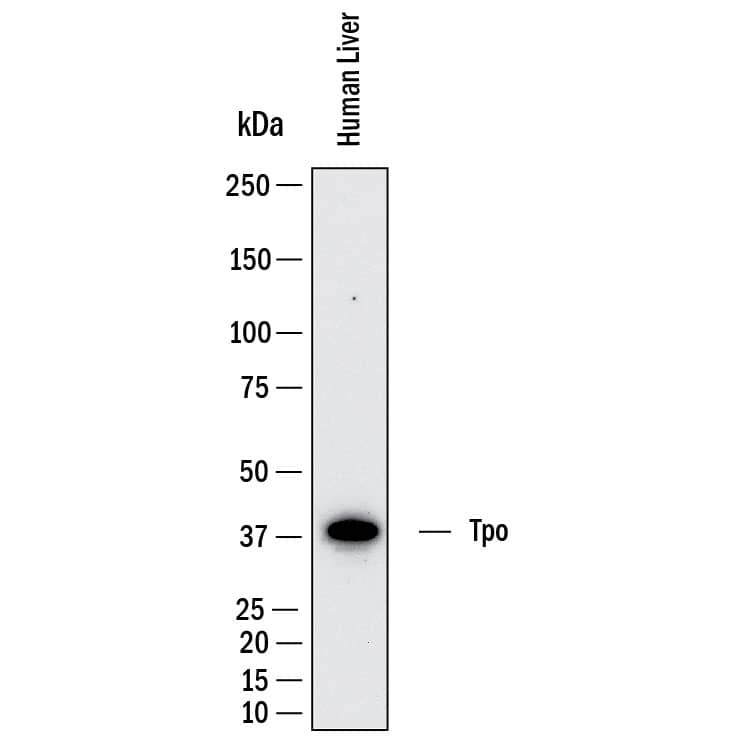Human Thrombopoietin/Tpo Antibody
R&D Systems, part of Bio-Techne | Catalog # MAB11609


Conjugate
Catalog #
Key Product Details
Species Reactivity
Human
Applications
Western Blot
Label
Unconjugated
Antibody Source
Monoclonal Mouse IgG1 Clone # 1065103
Product Specifications
Immunogen
Spodoptera frugiperda, Sf 21 (baculovirus)-derived human Thrombopoietin/Tpo
Ser22-Gly353
Accession # P40225
Ser22-Gly353
Accession # P40225
Specificity
Detects recombinant protein specific for human Thrombopoietin in Direct ELISA.
Clonality
Monoclonal
Host
Mouse
Isotype
IgG1
Scientific Data Images for Human Thrombopoietin/Tpo Antibody
Detection of Human Thrombopoietin/Tpo by Western Blot.
Western Blot shows lysates of human liver tissue. PVDF membrane was probed with 2 µg/ml of Mouse Anti-Human Thrombopoietin/Tpo Monoclonal Antibody (Catalog # MAB11609) followed by HRP-conjugated Anti-Mouse IgG Secondary Antibody (Catalog # HAF018). A specific band was detected for Thrombopoietin/Tpo at approximately 38 kDa (as indicated). This experiment was conducted under reducing conditions and using Western Blot Buffer Group 1.Applications for Human Thrombopoietin/Tpo Antibody
Application
Recommended Usage
Western Blot
2 µg/mL
Sample: Human liver tissue
Sample: Human liver tissue
Formulation, Preparation, and Storage
Purification
Protein A or G purified from ascites
Reconstitution
Reconstitute lyophilized material at 0.2 mg/ml in sterile PBS. For liquid material, refer to CoA for concentration.
Formulation
Lyophilized from a 0.2 μm filtered solution in PBS with Trehalose.
Shipping
Lyophilized product is shipped at ambient temperature. Liquid small pack size (-SP) is shipped with polar packs. Upon receipt, store immediately at the temperature recommended below.
Stability & Storage
Use a manual defrost freezer and avoid repeated freeze-thaw cycles.
- 12 months from date of receipt, -20 to -70 °C as supplied.
- 1 month, 2 to 8 °C under sterile conditions after reconstitution.
- 6 months, -20 to -70 °C under sterile conditions after reconstitution.
Background: Thrombopoietin/Tpo
References
- Deutsch, V.R. and A. Tomer (2006) Br. J. Haematol. 134:453.
- Kaushansky, K. (2005) J. Clin. Invest. 115:3339.
- Li, J. et al. (1999) Br. J. Haematol. 106:345.
- Bartley, T.D. et al. (1994) Cell 77:1117.
- de Sauvage, F.J. et al. (1994) Nature 369:533.
- Marcucci, R. and M. Romano (2008) Biochim. Biophys. Acta 1782:427.
- Kaushansky, K. et al. (1994) Nature 369:568.
- Kaushansky, K. et al. (1995) Proc. Natl. Acad. Sci. 92:3234.
- Broudy, V.C. et al. (1995) Blood 85:1719.
- Lok, S.I. et al. (1994) Nature 369:565.
- Chen, J. et al. (1995) Blood 86:4054.
- Oda, A. et al. (1996) Blood 87:4664.
- Van Os, E. et al. (2003) Br. J. Haematol. 121:482.
- Kato, T. et al. (1997) Proc. Natl. Acad. Sci. 94:4669.
- Ehrenreich, H. et al. (2005) Proc. Natl. Acad. Sci. 102:862.
- Samoylenko, A. et al. (2008) Cell. Signal. 20:154.
Alternate Names
MGDF, MK-CSF, MKCSF, MPLLG, THCYT1, THPO, Tpo
Gene Symbol
THPO
UniProt
Additional Thrombopoietin/Tpo Products
Product Documents for Human Thrombopoietin/Tpo Antibody
Product Specific Notices for Human Thrombopoietin/Tpo Antibody
For research use only
